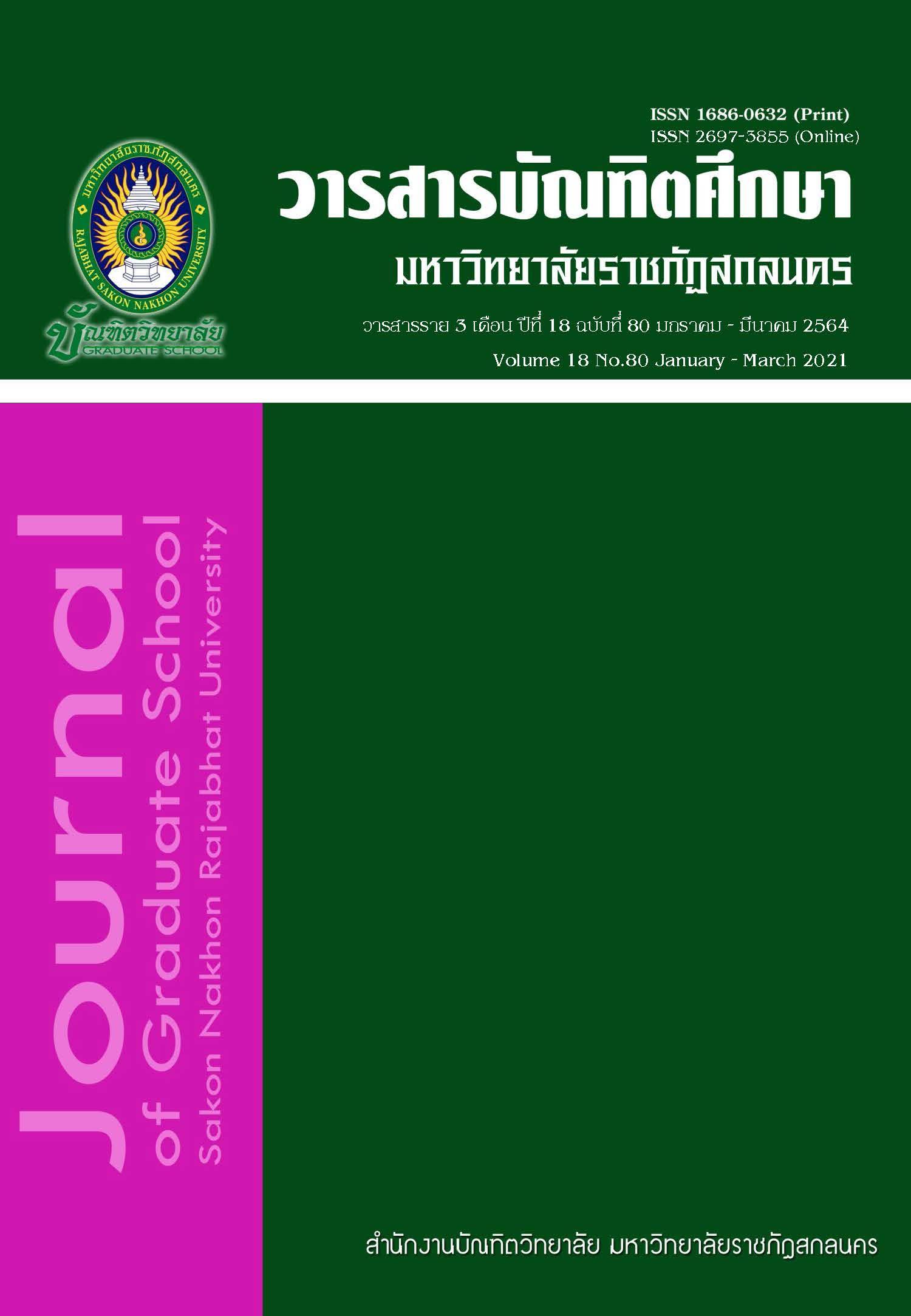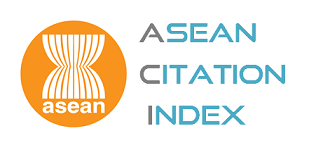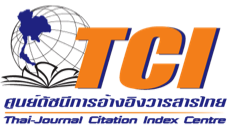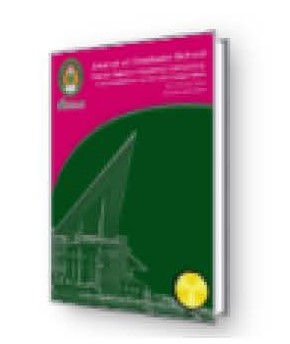วัฒนธรรมองค์การและภาวะผู้นำเชิงจริยธรรมที่ส่งผลต่อประสิทธิผล การดำเนินงานของหมู่บ้านต้นแบบด้านการป้องกันการทุจริต
Keywords:
Organizational Culture, Ethical Leadership, Corruption PreventionAbstract
The quantitative research aimed to examine the influence of organizational culture and ethical leadership on the operational effectiveness of the prototype villages on corruption prevention, both direct and indirect influences. The sample group was 300 residents of three prototype villages for corruption prevention in the Upper Northeastern Region 2, selected by a stratified sampling. The research instrument was a set of 5-point scale questionnaires with a reliability value between .895 and .970, and the discriminant power of items equal to .456-.864. The data were analyzed using frequency, percentage, mean, and standard deviation. For the hypothesis testing, the researchers employed a multiple regression analysis and path analysis to determine the influence of independent variables on the dependent variables through the interstitial variables.
The research found that organizational culture and ethical leadership affected the operational effectiveness of the corruption prevention prototype villages of 51.40 percent, and 61.70 respectively with a statistical significance of .01 level. In addition, the organizational culture indirectly affected the effectiveness of corruption prevention performance through ethical leadership by 42.40 percent, which was statistically significant at the .01 level.
References
จารุวรรณ สุขุมาลพงษ์. (2556). ผลการวิจัยเรื่อง แนวโน้มของคอรัปชั่นในประเทศไทย. กรุงเทพฯ: สำนักงานกฎหมาย สำนักงานเลขาธิการสภาผู้แทนราษฎร.
ชนิดา จิตตรุทธะ. (2559). วัฒนธรรมองค์การ : องค์กรปกครองส่วนท้องถิ่นไทยและปัจจัยกำหนดความสำเร็จทางวัฒนธรรม. (พิมพ์ครั้งที่ 2). กรุงเทพฯ: จุฬาลงกรณมหาวิทยาลัย.
ชุติมา รักษ์บางแหลม. (2559). การวิเคราะห์องค์ประกอบภาวะผู้นำเชิงจริยธรรมและประเด็นปัญหาจริยธรรมในการบริหารสถานศึกษาของผู้บริหารวิทยาลัยพยาบาลสังกัดสถาบันพระบรมราชชนก กระทรวงสาธารณสุข. วิทยานิพนธ์ ศษ.ด. สงขลา: มหาวิทยาลัยสงขลานครินทร์.
ทัชเชษฐ์ นิยมสุข. (2560). ภาวะผู้นำทางจริยธรรมของนายกเทศมนตรีที่ส่งผลต่อประสิทธิภาพองค์การ. วารสารวิชาการมหาวิทยาลัยปทุมธานี, 10(1), 215-228.
พงษ์เทพ จันทสุวรรณ. (2553). ภาวะผู้นำ วัฒนธรรมองค์การกับประสิทธิผลองค์การของโรงเรียนในสังกัดกรุงเทพมหานาคร : ตัวแบบสมการโครงสร้าง. ดุษฎีนิพนธ์ ปร.ด. กรุงเทพฯ: สถาบันบัณฑิตพัฒนบริหารศาสตร์.
พิชัย โสวจัสสตากุล. (2557). ภาวะผู้นำเชิงจริยธรรมของนากยกเทศมนตรีกับความผูกพันต่อองค์การของพนักงานเทศบาลตำบลนาป่า อำเภอเมือง จังหวัดชลบุรี. วิทยานิพนธ์ รป.ม. ชลบุรี: วิทยาลัยการบริหารรัฐกิจ มหาวิทยาลัยบูรพา.
มูลนิธิต่อต้านการทุจริต. (2562). เอกสารประกอบการประชุมคณะทำงานประเมินหมู่บ้านช่อสะอาด ประจำปีงบประมาณ 2561. นนทบุรี: มูลนิธิต่อต้านการทุจริต.
รัตติกรณ์ จงวิศาล. (2556). ภาวะผู้นำ ทฤษฎี การวิจัย และแนวทางสู่การพัฒนา. กรุงเทพฯ: โรงพิมพ์แห่งจุฬาลงกรณ์มหาวิทยาลัย.
สุธาสินี แม้นญาติ. (2554). โมเดลความสัมพันธ์โครงสร้างปัจจัยที่ส่งผลต่อภาวะผู้นำเชิงจริยธรรมของผู้บริหารสถานศึกษา สังกัดกรมส่งเสริมการปกครองท้องถิ่น. วิทยานิพนธ์ ปร.ด. ขอนแก่น: มหาวิทยาลัยขอนแก่น.
สัญญาศรณ์ สวัสดิ์ไธสง. (2018). Enhancing the Operational Transparency of Higher Education Institutes in Sakon Nakhon, Thailand. วารสารมหาวิทยาลัยราชภัฏมหาสารคาม, 12(ฉบับพิเศษ), 41-52.
องค์กรเพื่อความโปร่งใสนานาชาติ. (2562). ดัชนีภาพลักษณ์การคอร์รัปชันในภาครัฐทั่วโลก (Corruption Perception Index-CPI) ประจำปี 2019/2562. เข้าถึงได้จาก www.bbc.com/thai/Thailand. 23 มกราคม 2563.
อุทัยวรรณ สายพัฒนา และฉัตรศิริ ปิยะพิมลสิทธิ์. (2547). Collinearity. วารสารปาริชาติ, 17(1), 55-62.
Perter F. Drucker. (2002). Managing in the Next Society. Oxford: Butterworth Heinemann.
DuBrin, A. J. (2005). Fundamentals of Organizational Behavior. (3rd ed). Canada: South-Western.
Charles B. Handy. (1991). Good of Management. (3rd ed.) Great Britain: business Book.
Davis, S. (1984). Managing Corporate Culture. Cambridge, MA: Ballinger.
Fox, J., & Weisberg, S. (2018). Car: Companion to Applied Regression. [R package]. Retrieved from https://cran.r-project.org/package=car. May 23th, 2020.
Hair, J.F., Black, W.C., Babin, B.J., Anderson, R.E. & Andersen, R.E. (2010). Multivariate Data Analysis: A Global Perspective. (7th ed) New Jersey: Pearson Education, Inc
Kerdpituk, C. & Jermsittiprasert, K. (2020). The influence of organizational culture, Employee commitment and organization citizen behavior or the HRM practice: Mediating role of perceived organization support. Systematic Reviews in phrases, 11(1), 407-415.
Chienwattanasook, K. & Jermsittiprasert, K. (2019). Effect of technology capabilities on sustainable performance of pharmaceutical firms in Thailand with moderating role of organizational culture. Systematic Reviews in Phrases, 10(2), 188-197.
Morgan, G. (1986). Images of Organization. California: Sage Publications.
Northouse, Peter G. (2003). Leadership Theory and Practice. (3rd ed.). Western. Michigan University: SAGE Publications.
Police Major Sornthas Aemlaor. (2014). Psychological Characteristics, Ethical Leadership and Organizational Climate in Relation to Core-value-based Work Behaviors of the Metropolitan Police. the Degree of Master of Business Administration Faculty of Commerce and Accountancy Thammasart University.
R Core Team (2018). R: A Language and environment for statistical computing. Retrieved from https://cran.r-project.org/. May 23th, 2020.
Steers. (1977). Antecedents and outcome of organizational commitment. administrative science quarterly.
Sriyakul, T. & Jermsittiprasert, K. (2020). Disastrous impact of corruption, political instability an expropriation risk on quality of education: Evidence from Asian Countries. Journal of Security and Sustainability Issues. 9(J), 228-239.
Swasthaisong S. (2019a). An Assessment Survey of Integrity and Transparency in Local Government Organization. International Journal of Crime, Law and Social Issues, 6(1), 90-98.
_______. (2019b). Integrated Causal Factors for and Guidance on the Enhancement of Transparency in Local Administrative Organizations in Northeastern Thailand. PSAKU International Journal of Interdisciplinary Research. Vol. 8, No. 2, in December 2019.
The jamovi project. (2019). Jamovi. (Version 1.0) [Computer Software]. Retrieved from https://www.jamovi.org. January 19th, 2020.
Downloads
Published
How to Cite
Issue
Section
License
บทความทุกบทความที่ตีพิมพ์ในวารสารบัณฑิตศึกษา มหาวิทยาลัยราชภัฏสกลนคร ถือว่าเป็นลิขสิทธิ์ของบัณฑิตวิทยาลัย มหาวิทยาลัยราชภัฏสกลนคร










